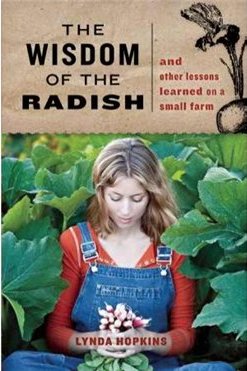
Have you ever wondered what it would be like to start farming? Not just as an experimental hobby or an idyllic-daydream, but as a down-to-earth lifestyle change where you put your economic future on the line? If you’re at all like Lynda Hopkins was just a few years ago, you’re a suburbanite who knows little, if anything, about growing produce or taking care of farm animals. Yet Lynda and her then boyfriend (now husband) did what many adventurous young couples have done in recent years — they started farming.
In The Wisdom of the Radish, Lynda shares stories from her first year as a newbie farmer. And let me tell you, it’s far from idyllic.
 Her stories aren’t very romantic or glamorized, but they are thought-provoking and honest. Crop failures, unpredictable weather, and animal predators may seem like bad news, but thankfully those aren’t her only stories. A steep learning curve is aided a bit by the advent of the internet. (If you’re reading this post, you know as well as anybody that forums and blogs are awfully handy for diagnosing problems and getting useful advice.) Perhaps the most meaningful story woven throughout the book is her growing acceptance of what it means to belong to the farm — how tending to the plot of land and routinely caring for the animals roots her, grounds her, and transforms her sense of identity.
Her stories aren’t very romantic or glamorized, but they are thought-provoking and honest. Crop failures, unpredictable weather, and animal predators may seem like bad news, but thankfully those aren’t her only stories. A steep learning curve is aided a bit by the advent of the internet. (If you’re reading this post, you know as well as anybody that forums and blogs are awfully handy for diagnosing problems and getting useful advice.) Perhaps the most meaningful story woven throughout the book is her growing acceptance of what it means to belong to the farm — how tending to the plot of land and routinely caring for the animals roots her, grounds her, and transforms her sense of identity.
The greatest plus to this book? Lynda Hopkins’ storytelling. She’s gifted. Really gifted. Check out a few of my favorite paragraphs to see what a wordsmith she is:
You simply couldn’t ask for a more sensual piece of produce. Round, ripe, firm yet yielding — squeezing a tomato is about as close to squeezing human flesh as one can get. (For all the jokes made about melons, they’re hard and unfriendly, nothing like the real thing.) And consider the color: while melons hide their brilliance inside dull rinds, tomatoes let it all hang out, lustrous and naked.
(page 100)I grew up eating meat, but it had been about seven years since I’d cooked it myself. To roast the rooster, I had to reach back deep into the memory bank, which in my case was more of a memory colander. I have a knack for remembering stories, but I rarely hold on to the facts that accompany them. So I remembered the arc of the roast: the naked massage with butter, salt and herbs, and the offerings — lemon, rosemary, garlic — stuffed inside the cavity; the frequent checking, basting, and temperature-taking; and the glorious finale when it’s pulled out of the oven, sliced into, and presented flawlessly on a white platter.
But I had no idea how to get from a naked massage to plated, browned bird. I called my mom the check what temperature I should set the oven for, and made up the rest.
(page 200)There’s no question that we’ll make this work…. Call me crazy, call me poor, call me covered in chicken shit. Call me tired, call me scared, call me satisfied, call me passionate. And did I mention crazy? Go ahead. But before you do, let me offer you a few eggs and a pair of Chihuahua-sized goat kids, and then we’ll see who’s crazy. Trust me, you don’t have to like worms, or even fresh tomatoes. There’s a little farm in all of us.
(page 238)
I’m a bigger fan of fiction books these days than I am of non-fiction. I think it’s the storytelling that draws me in. Stories are less about how and more about why. Stories cultivate the imagination and challenge the heart. Thankfully, this little non-fiction book is full of stories. Good, old-fashioned anecdotes guaranteed to let you live vicariously, smile ruefully, and pine wistfully. Maybe they’ll also help you appreciate where you’re at as well as where you want to be — who you want to be.
I’m glad I read The Wisdom of the Radish. I bet you’ll be glad to read it, too.
 |
















This books sounds like delectable reading – it may just inspire me to start a backyard garden next year. I absolutely LOVE the cover – brilliant design and photo.
This sounds very cool. I’d never heard of the book before. But I can certainly relate to many/all of the hardships you mentioned. It is NOT easy to be a young couple starting a farm. There is definitely a steep learning curve as you said, and it’s impossible to anticipate the beatings you’ll receive from (sometimes it seems) everywhere at once. (Nature, wildlife, people) And we’ve made LOTS of mistakes. For example: we bought an abused jersey cow and calf for WAY too much money because we felt sorry for her. Just an FYI…this is a BAD business tactic. We ended up spending more money on vet visits, and countless hours on care. I never thought I’d be traipsing out into the field at 12:00 am to give a baby calf her antibiotic shot. Calfs are hard to find in the dark…if you try it…bring a group…
But seeing those cows healthy is rewarding. And so are the fresh tomatoes!
Maybe someday…
My husband and I bought a 1.5 acre property with a lovely home last May. We had dreams of a lush garden and a dozen pastured chickens. Alas, we are still around the corner at his mom’s while we try to figure out why my husband can’t breathe there.
My dad has driven 2 hours one direction several times to help me get a garden started. He spent hours tilling. I planted seeds. But our soil is far too much clay. The poor little seedlings couldn’t push through! So my dad is coming again this weekend to till in some sand and some of our neighbor’s steer/pig/donkey manure. We agreed that this year we’ll condition the soil and maybe have some produce in the fall.
I should read this book. It sounds like a great inspiration! Thank you so much for this post.